
Transcription
—Free all P.O.Ws/P.Ps—
Free Leonard Peltier
Leonard Peltier is an imprisoned Native American considered by many to be a political prisoner.
He was convicted for the deaths of two FBI agents who died during a 1975 shootout on the Pine Ridge Reservation in the wake of the 1973 Wounded Knee occupation. 1973 marked the beginning of a three year period of violence on the reservation. The tribal chairman hired vigilantes, self-titled as "GOONS," to rid the reservation of the American Indian Movement (AIM).
More than 60 traditional tribal members and AIM members were murdered. Evidence indicated GOON responsibility in the majority of the crimes but, despite a large FBI presence, nothing was done to stop the violence.
Peltier was an AIM leader and was asked by traditional people at Pine Ridge, South Dakota to support and protect the traditional people being targeted for violence. Peltier and a group of AIM members set up camp on a ranch owned by the traditional Jumping Bull family.
On June 26, 1975, two FBI agents in unmarked cars followed a pick-up truck onto the Jumping Bull ranch. The families immediately became alarmed and feared an attack. Shots were heard and a shootout erupted. More than 150 agents, GOONS, and law enforcement surrounded the ranch.
When the shootout ended, the two FBI agents and one Native American lay dead. The agents were injured in the shootout and were then shot at close range. The Native American, Joseph Stuntz, was shot in the head by a sniper's bullet. Stuntz's death has never been investigated, nor has anyone ever been charged in connection with his death.
According to FBI documents, more than 40 Native Americans participated in the gunfight, but only Bob Robideau, Darrell Butler, and Peltier were brought to trial.
Robideau and Butler were arrested first and went to trial. A federal jury in Iowa acquitted them on grounds of self-defense, finding that their participation in the shootout was justified given the climate of fear that existed on the reservation.
Peltier was arrested in Canada in 1976. The U.S. presented the Canadian court with affidavits by Myrtle Poor Bear who said she was Peltier's girlfriend and allegedly saw him shoot the agents. In fact, Poor Bear had never met Peltier and was not present during the shootout. Soon after, Poor Bear recanted her statements and said the FBI threatened her and coerced her into signing the affidavits.
Peltier was extradited to the U.S. where he was tried in 1977. The trial was held in North Dakota. Unlike the Iowa trial, evidence on violence on Pine Ridge was severely restricted. An FBI agent, who had previously testified that they had a pickup truck on the scene, changed his account, stating that the agents had followed a van onto the scene, a vehicle which Peltier drove occasionally.
Three teenager witnesses testified against Peltier, but later admitted that the FBI forced them to testify. The government claimed it had provided the defense with all FBI documents concerning the case, but 140,000 pages had been withheld. A FBI ballistics expert testified that a casing found near the agents' bodies matched the gun tied to Peltier. However, a ballistics test proving the casing did not come from the gun tied to Peltier was intentionally concealed. The jury, unaware of the facts, found Peltier guilty. He was sentenced to two consecutive life terms.
Following the discovery of new evidence, Peltier sought a new trial. The Eight Circuit ruled, "There is a possibility that the jury would have acquitted Peltier had the record and data improperly withheld from the defense been available to him in order to better exploit and reinforce the inconsistencies casting strong doubts upon the government's case." Yet the court denied a new trial.
The government attorney conceded that the government does not know who shot the agents, stating that Peltier is equally guilty whether he shot the agents at point-blank range or participated in the shootout from a distance.
Judge Heaney, the appeals court judge, has since voiced firm support for Peltier's release, stating that the FBI used improper tactics, the FBI was equally responsible for the shootout, and that Peltier's release would promote healing with Native Americans. Peltier suffers from diabetes, high blood pressure, and a heart condition. Time for justice is short.
GET INVOLVED IN THE FIGHT TO FREE LEONARD PELTIER!
Nationally: Leonard Peltier Defense Committee
https://www.whoisleonardpeltier.info
Locally: Lake Superior Socialist Action
www.thenorthernworker.blogspot.com
Other posts by this author
|
2021 dec 19
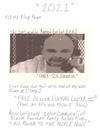
|
2020 jul 11
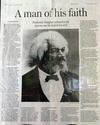
|
2020 jul 6
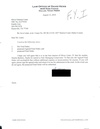
|
2020 jul 2
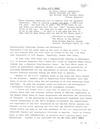
|
2020 jun 30
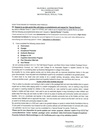
|
2018 dec 13
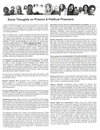
|
More... |
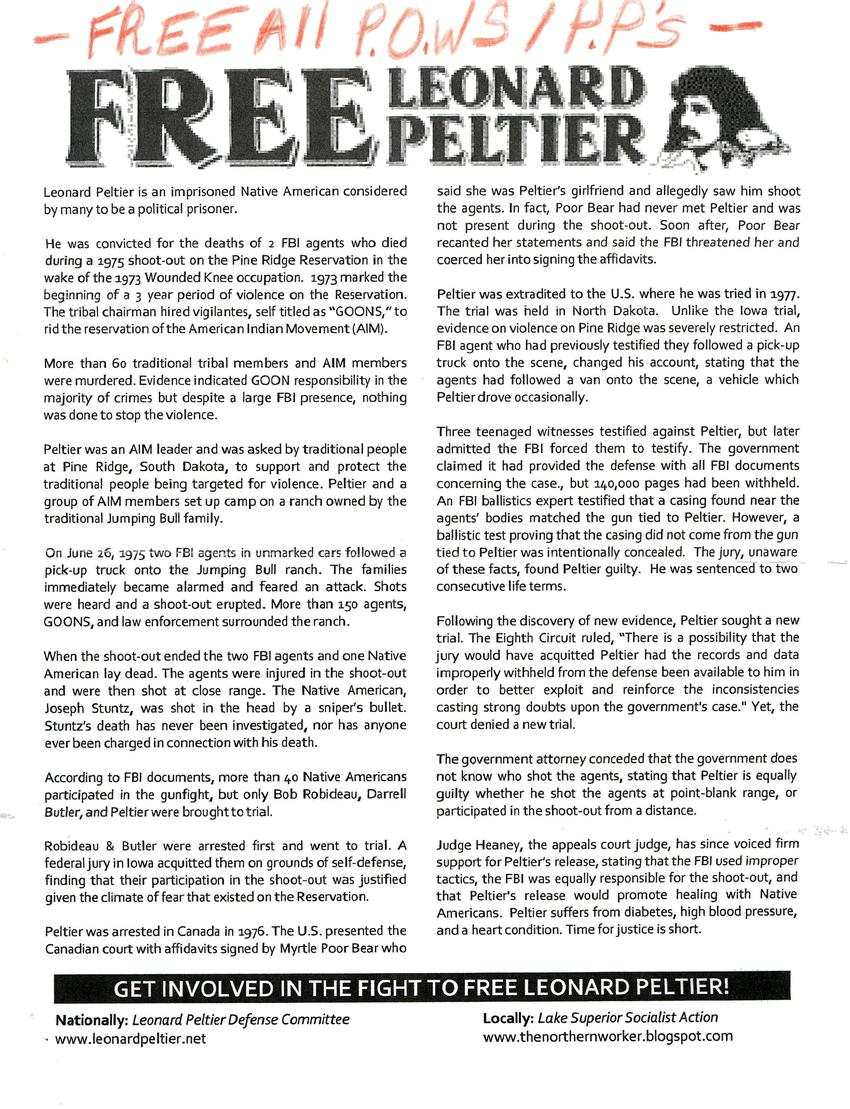

Replies